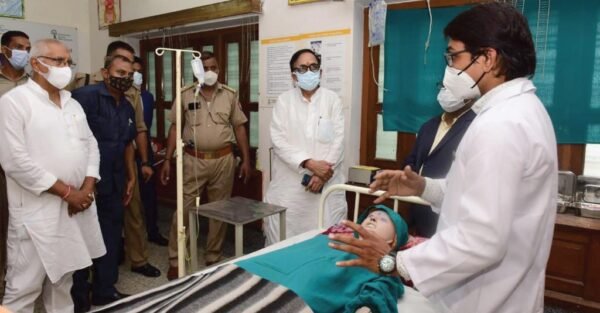Learning from past trends, Corporate Social Responsibility (CSR) will pave the way towards resilient strategies and robust outcomes. CSR played a crucial role in the COVID-19 pandemic. Businesses are helping make the basic health and research to ensure the country can meet such challenges in future.

Preventive healthcare is an important dimension of health– SDG 3, that needs significant attention and investment from all sections of society. It is a national health priority and a notified area under Schedule VII of the CSR Section 135 of the Companies Act. Preventive healthcare directly improves the health, well-being, and productivity of the community/population, families, and individuals and promotes equity by benefiting the most disadvantaged and marginalized groups. It covers a range of public health activities focused on preventing diseases, promoting good health, and strengthening health systems.
A few companies have provided health insurance to essential service providers to address financing, policy, and governance efforts. Simultaneously, public and private partnerships have invested in many strategies for mass testing, medical research, and hand-washing campaigns.
India is the first country to make corporate social responsibility compulsory for the specified class of companies. They need to spend 2% of the average profit of the last three financial years towards its social responsibility. Interestingly, 60% of the CSR budget directly goes to health and education, as the nation’s priorities are health care, medical research, and education infrastructure development.
Spending on these sectors by companies also wins the hearts of the public. This spending on health and education sections always has a footprint on that organization. As per the NITI Ayog annual report for the financial year, around 33% of the CSR fund is directly allocated to educational purposes by the corporation and 17.25% toward health care and its infrastructure. This paper analyses how this spending will transform India’s infrastructure and economy.
 More than 50% of the total CSR of healthcare goes to medical research, ensuring healthcare and research in the medical field, will be fruitful shortly. Spending on health care and medical research is significant for the nation’s growth.
More than 50% of the total CSR of healthcare goes to medical research, ensuring healthcare and research in the medical field, will be fruitful shortly. Spending on health care and medical research is significant for the nation’s growth.
Companies such as Tata Group, RIL, Vedanta, Adani Group of Industries, and IT majors like Infosys, Wipro, and Tech Mahindra spend around 30% of their budget on health and medical research only. Indian companies have one thing in common among them–they are allocating their CSR funds to health big time. Most funds go to healthcare, education, and rural development, which are vital for a nation’s growth.
The CSR spending across the Indian states is unequal, per the NITI Aayog report, where Maharashtra, Gujarat, and Karnataka get 27.50% of total CSR funds. In contrast, all seven northeastern states get only 0.42%. To mitigate this, the central government may amend Schedule Seven by adding activities related to northeastern state development. For example, a specific percentage shall be allocated to hilly and northeastern states.
CSR is a “self-regulating business model”, which implies the procedures of interaction by a company with its stakeholders and the general public to create a scenario of being socially responsible. On March 23, 2020, all expenditures incurred on activities related to COVID-19 were announced to be added as the permissible avenues for CSR expenditure.
It was further informed that the funds might be spent on promoting preventive healthcare, sanitation, and disaster management. The CSR community quickly took up the mantle to drive its response initiatives with internal approval processes. Even before this announcement, we saw examples of benevolent individual corporate leaders offering resources to combat COVID-19. Companies have been motivated to participate in COVID-19 responses by funding nonprofits and PM CARES Funds and taking part themselves, whether through manufacturing PPE kits or driving relief efforts in their community. Since the announcement of the PM CARES fund and its inclusion in Schedule VII of the Companies Act 2013 through a subsequent amendment, a huge amount of funding has also been directed from corporates to the PM Cares Fund.
Annual Report 2020-2021, Department of Health & Family Welfare Ministry of Health & Family Welfare Government of India highlights that Software has been developed in collaboration with the CSR initiative of M/s. Dell India & Tata Trusts for implementing PBS for prevention, control, screening, and management of population-based screening of common NCDs. The Department would implement an action plan at the highest level to expedite activities on HIV awareness and prevention and provide support from the CSR fund of private and public sector undertakings.
CSR is expected to become more structured over time and involve mechanisms that better align with SDGs. Over time, CSR will aid in more technological innovations and reduce production costs for many industries.



















